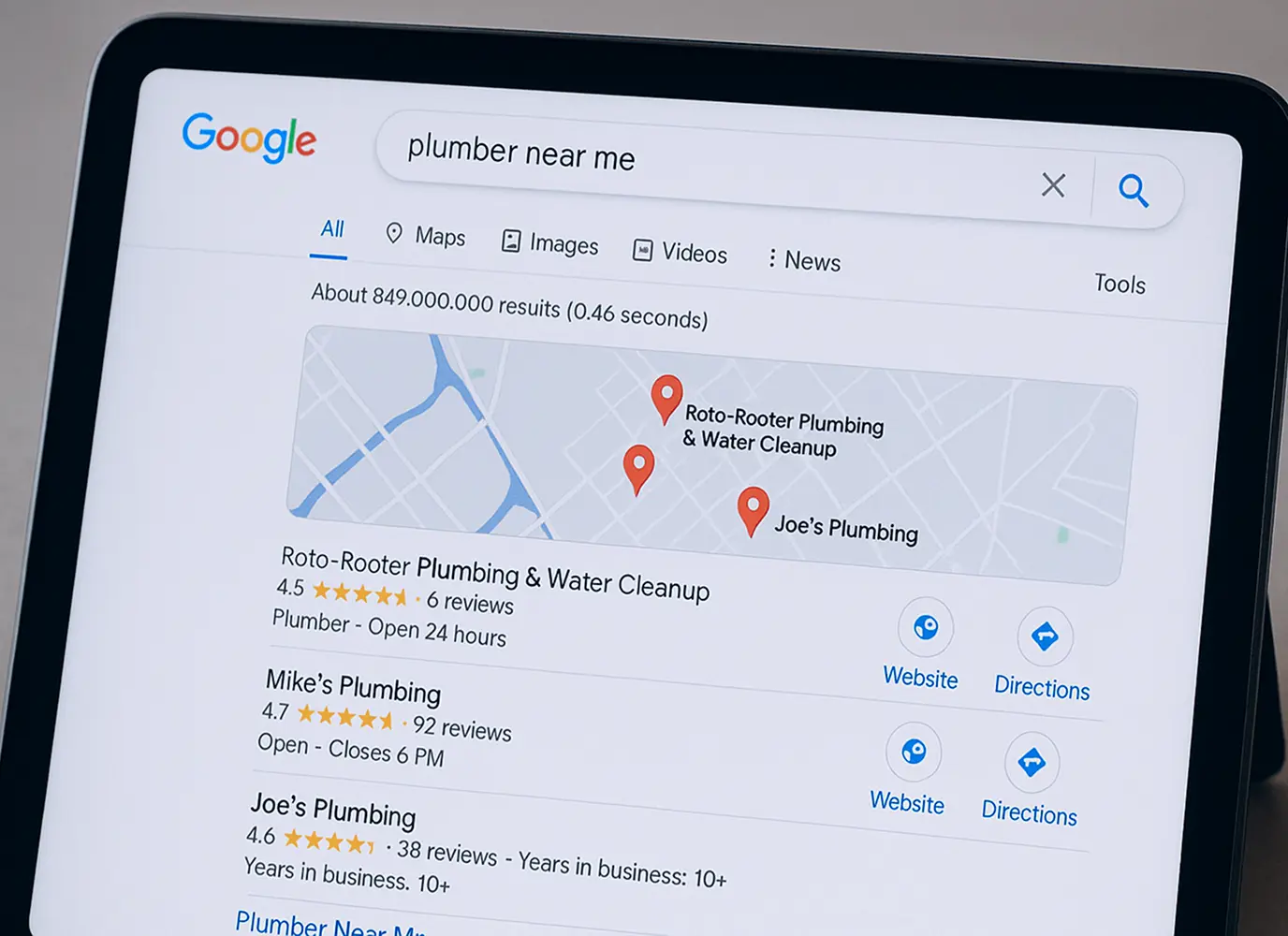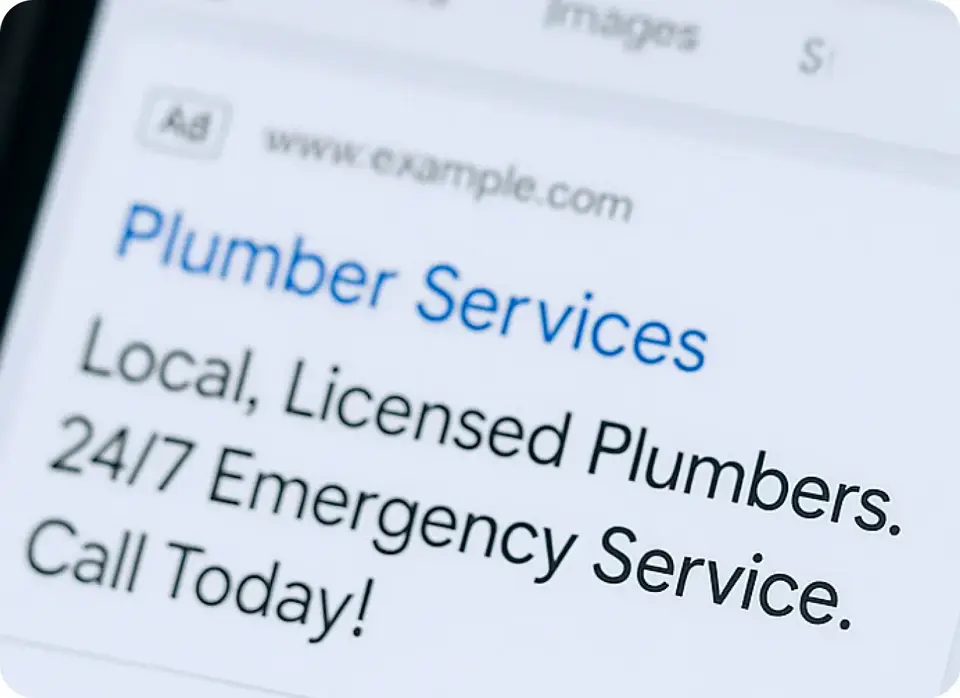The days of relying solely on the yellow pages or word-of-mouth to grow your plumbing business are long gone. When someone has a leaky faucet or a burst pipe, their first move is usually to grab their phone and search online for a plumber nearby. That’s why being easy to find on Google is crucial.
If your plumbing company isn’t showing up prominently when people in your area search for the services you offer, it’s almost as if your business doesn’t exist to those potential customers. On the other hand, if you do rank well (say, on the first page of results), you can enjoy a steady stream of new leads and calls without any extra prodding.
This is where SEO – Search Engine Optimization – comes into play. Simply put, SEO is about making improvements to your online presence so that you show up higher in search results and get noticed by more people who need your services. Good SEO can directly translate into more customers and more revenue. (One industry stat even found that leads from SEO convert into customers at a much higher rate than traditional advertising leads.) For plumbing businesses, mastering SEO means that when a homeowner in your town urgently searches “emergency plumber” or “water heater install,” your name is the one they see and click.
In this blog post, we’ll break down what SEO is, why it’s important for plumbing companies, and the different facets of SEO — local, on-page, technical, and off-page — with practical strategies for each. We’ll also share a real-world success story of a plumbing business that achieved double-digit growth and a remarkable ROI by upping their SEO game (with a little help from Scorpion). By the end, you’ll have a roadmap for improving your own SEO, so you can improve your visibility in search results and win more business. Let’s dive in!
What is SEO?
At its core, search engine optimization (SEO) is the practice of making your website and online content more attractive to search engines like Google. The goal is to rank higher in the organic (unpaid) search results so that more people can find your business. A formal definition is that SEO is the process of improving the quality and quantity of website traffic from search engines. In other words, when someone searches for a keyword related to your services (like “water heater repair” or “plumber near me”), good SEO increases the chances that your website appears among the top results.
SEO involves a mix of strategies. Some of it is about the words and information on your site (making sure your site clearly communicates what you do and where you do it). Some of it is about how your site is built behind the scenes (for example, that it loads fast and is mobile-friendly). And some of it extends beyond your site – like other websites linking to yours or customers leaving you good reviews online, which can enhance your credibility. All these elements send signals to search engines that your business is relevant and trustworthy.
Keep in mind, SEO is about earning visibility in the regular search listings – not the paid ads section. You can’t buy your way to the top of organic search results; you have to earn it by providing value and being the best answer to what users are looking for.
The reward for doing so is big: unlike paid advertising, clicks from organic search are free, and the effects of SEO can be long-lasting.
By investing time in SEO, you build an online asset (your website’s reputation with Google) that can keep attracting customers day after day.
Why SEO Matters for Plumbing Businesses
So why should a plumber invest time (or money) in SEO? Because that’s where your customers are looking. When a plumbing emergency strikes or a homeowner is planning a project, almost all of them turn to a search engine to find help. Often these searches have a strong sense of urgency and local intent – someone might literally search “emergency plumber near me” at 11 p.m. If your business shows up at that moment, you’re very likely to get a call.
Nearly half of all Google searches are seeking local information, and we have found half of home service customers make a decision within four hours of searching. (The Scorpion Pulse)
In short, being visible at the exact time someone needs a plumber makes it far more likely you’ll win their business.
SEO also helps build your credibility with potential customers. People tend to trust Google’s judgment – if your company appears at the top of the results, consumers assume you must be one of the best options. Plus, your online reviews are front and center alongside your listing.
64% of consumers only consider providers with at least a 4-star rating, so a strong star-rating can heavily influence choice.
By optimizing your online presence (through SEO techniques that also encourage reviews and ratings), you’re not just getting seen – you’re shaping a positive first impression that builds trust even before the first phone call.
There’s also the competitive angle. Let’s face it: in most areas, there are many plumbers vying for customers. If your competitors invest in SEO and you don’t, they’ll be the ones showing up when locals search for services, even if you might have the better business in reality. Showing up on the first page (especially in the top few results) can be the difference between getting a customer and them never even knowing you exist. Very few searchers click to the second or third page of results. Ranking highly means you capture a significantly larger share of the jobs being searched for online, effectively outpacing competitors who aren’t as visible.
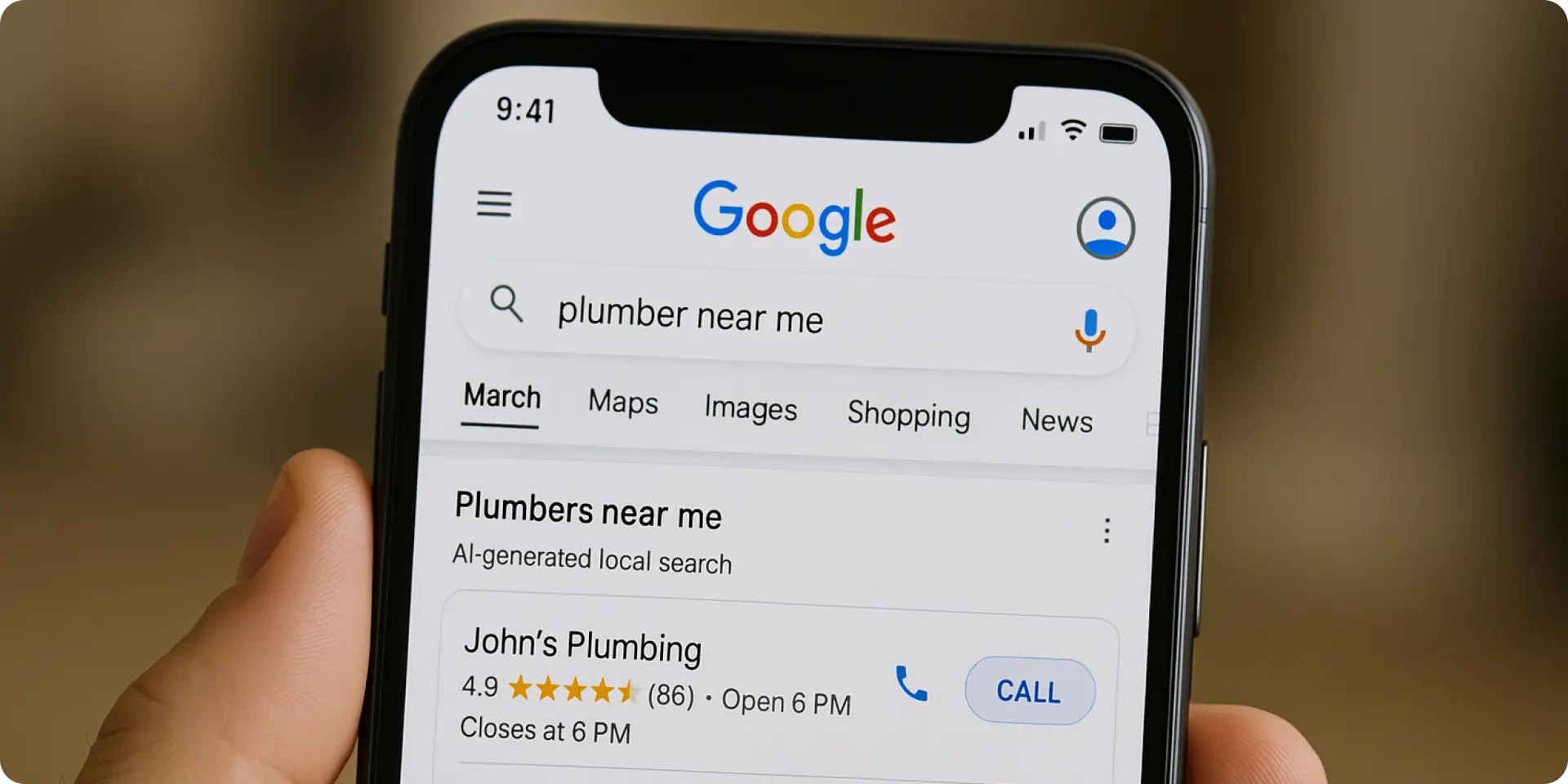
Finally, SEO offers a strong return on investment for plumbing companies. While it takes effort to get going, the leads you gain from organic search are essentially free – you’re not paying Google for clicks. And because these potential clients are actively searching for a plumber, they’re highly qualified leads.
Over time, a well-optimized website can become a dependable source of new business that doesn’t require constant advertising spend. Many plumbing businesses find that SEO isn’t just about getting more website traffic – it’s about consistently converting online visitors into real, paying customers, which is the ultimate goal.
Local SEO: Getting Found in Your Area
For a local service business like plumbing, Local SEO is absolutely critical. It focuses on making sure your business appears in location-based searches – typically, those are searches that include a location or assume one (like “plumber near me” or “plumber in [Your City]”). When nearby customers search for a plumber, you want your business to be front and center on the results page, especially in the Google Maps section.
Local SEO focuses on appearing in geographically relevant searches. For example, when someone searches “plumber near me,” Google displays a map and a few top local plumbing businesses. By optimizing your Google Business Profile and earning great reviews, you increase your chances of showing up in this coveted local 3-pack.
Some key steps to improve your local SEO include:
- Claim and optimize your Google Business Profile (GBP): This is the free listing that powers Google Maps results. Make sure you have claimed your business on Google and filled out all the details. Choose the right categories (e.g., Plumber), add a thorough description of your services, your service areas, business hours, and plenty of photos of your work or team. A well-optimized Google profile is often the #1 factor in getting into the local map pack.
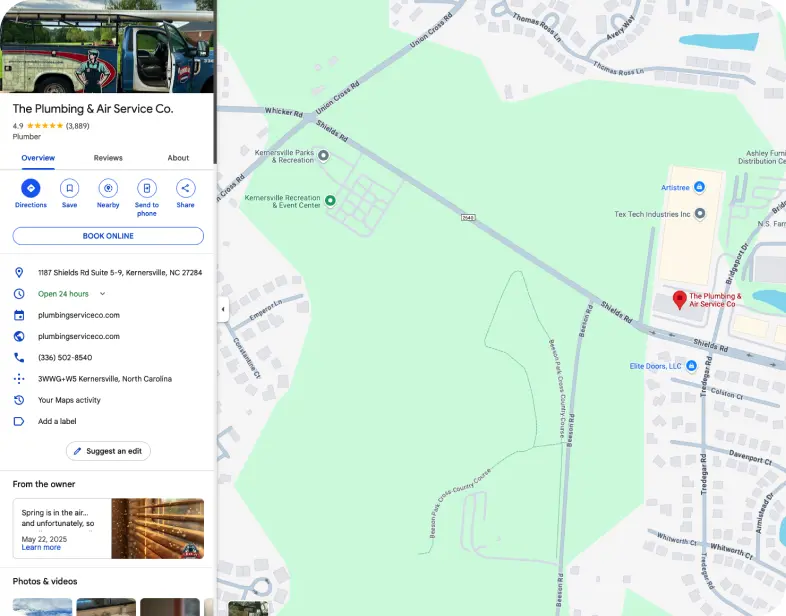
- Ensure NAP consistency: NAP stands for Name, Address, Phone number. Keep this information exactly the same everywhere your business is listed online – your website, Google profile, Yelp, Facebook, Angie’s List, and so on. Inconsistent contact info can confuse customers and search engines alike. Consistency helps Google trust that all these mentions are the same business, reinforcing your local presence.
- Encourage customer reviews: Reviews are gold for local SEO. Businesses with lots of positive reviews tend to rank better in local results, and obviously they look more appealing to customers. Ask satisfied clients to drop a quick review on your Google profile (and maybe other platforms like Yelp). Respond to reviews professionally – thank happy customers and address any negative feedback calmly. A steady stream of good reviews signals both to Google and to prospects that you’re a reliable, quality service.
- Use local keywords on your site: Incorporate your city or region name into your website content where appropriate. For example, your homepage might say “Serving homeowners in [City, State] since 2005,” or you might have pages like “Emergency Plumbing in [City].” This helps search engines associate your business with the areas you serve. Don’t overstuff these terms unnaturally, but do make it clear what locations you cover.
- List your business in online directories: Make sure your plumbing company is listed in other reputable online directories and map services. This includes Yelp, Bing Places, Apple Maps, HomeAdvisor, Angi, the Better Business Bureau, and local chamber of commerce directories. These listings (called citations) not only help people find you, but having your NAP info on many trusted sites also reinforces your legitimacy in Google’s eyes.
By excelling in local SEO, you increase the odds that a neighbor in your community finds your name at the top of their search results. Imagine a homeowner in your town searching for “drain cleaning service.” If you’ve nailed your local SEO, they’ll see your Google Business Profile with a glowing rating, notice that you’re nearby and open, and likely give you a call right then and there.
That's the power of local SEO – capturing customers right when and where they’re looking for help.
On-Page SEO: Optimizing Your Website Content
On-page SEO is all about the content on your website – what it says and how it’s structured. The goal here is to ensure that search engines clearly understand what services you offer and that visitors get the information they need (which ultimately convinces them to choose you). Here are on-page SEO best practices for a plumbing website:
- Use dedicated pages and relevant keywords for each service: Don’t lump all your services on one generic page. Instead, create separate pages for each major service you offer (e.g., “Water Heater Installation,” “Drain Cleaning,” “Sewer Line Repair”). On each page, use the keywords people would search for in that context. For example, your water heater page should mention phrases like “water heater repair,” “water heater replacement,” etc. Include the city or area for local relevance (“water heater repair in [City]”). Also, make sure each page has a clear, descriptive title (an <h1> heading on the page itself) that matches the service – this helps search engines and users alike know they’re in the right place.
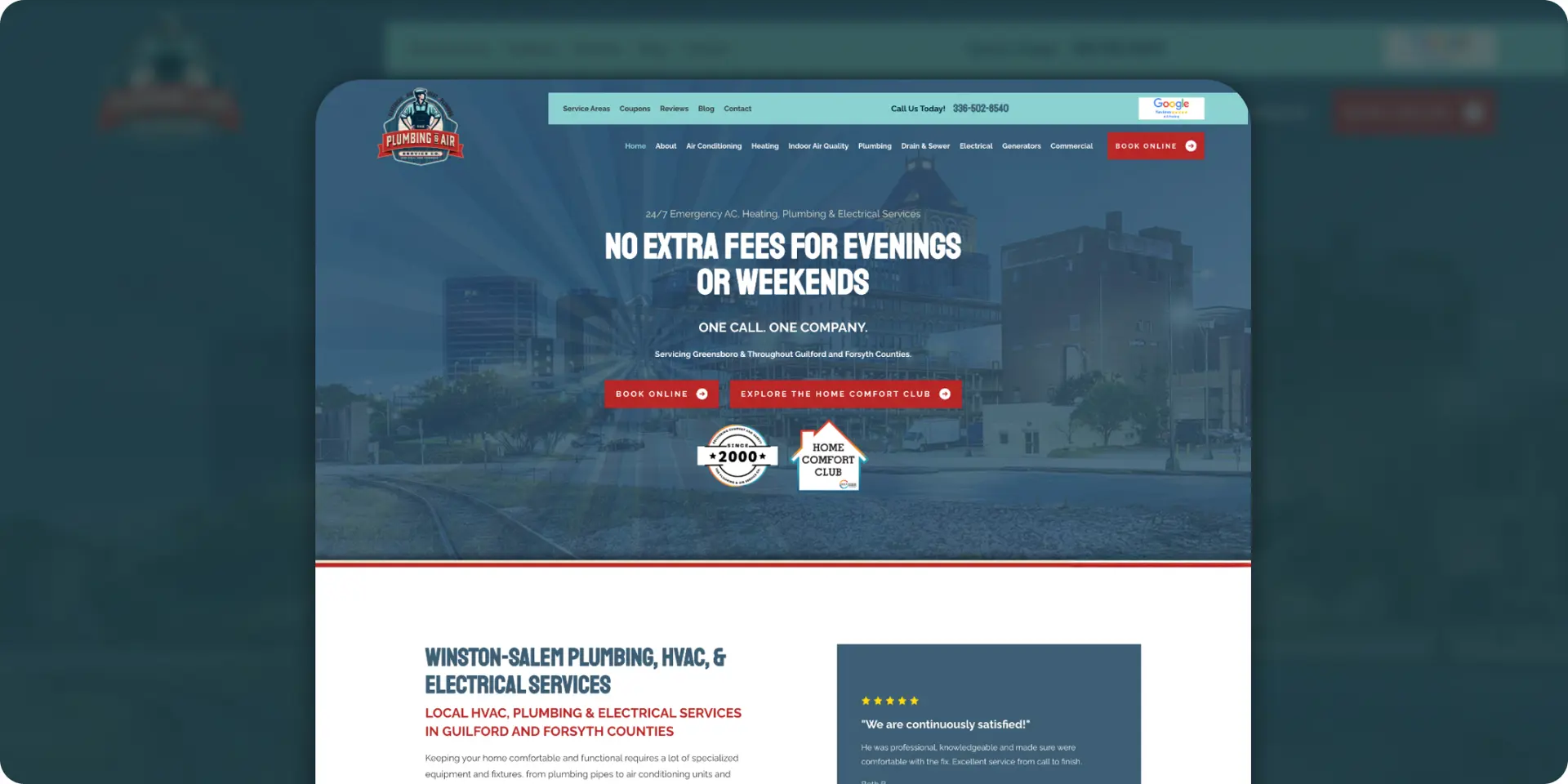
- Publish useful, high-quality content: Quality content is your chance to shine and connect with visitors. On your service pages, explain what’s involved in that service, answer common customer questions, and highlight what makes your approach or warranty special. Consider adding a blog or FAQ section to address common plumbing issues or maintenance tips (e.g., “5 Signs Your Water Heater Needs Replacement”). By providing genuinely helpful information, you not only improve your SEO (Google rewards content that is useful and relevant) but also build trust with readers – they’ll see you know your stuff.
- Optimize your meta titles and descriptions: These are the snippets that show up on Google’s results page. For each page on your site, set a unique meta title (the clickable headline in search results) around 50-60 characters that includes your target keywords and your business name. For example: “Drain Cleaning in Springfield | Joe’s Plumbing.” Similarly, write a meta description (brief summary underneath the title, ~150 characters) that entices people to click. It might be something like, “Clogged drain? Our Springfield plumbers offer fast, affordable drain cleaning. Call 24/7 for service.” Optimizing these tags with keywords and compelling language can improve your click-through rate – and pages that get more clicks can increase rankings.
- Link your pages together: Make sure the pages on your site are interlinked in a logical way. If you mention a related service on a page or blog post, turn that into a clickable link to the relevant page. For instance, on your kitchen plumbing page, if you discuss garbage disposals and you have a separate page for “garbage disposal repair,” link to it. Internal links help guide visitors to more information (keeping them on your site longer) and also help search engine crawlers discover and understand the structure of your site. A well-connected site is easier for Google to navigate and index.
By implementing strong on-page SEO, you make your website a magnet for relevant searches.
For example, imagine a homeowner Googling “why is my water heater making popping noises.” If you’ve written a blog post or FAQ addressing that exact question – and it links to your “Water Heater Repair” service page – you have a great chance of not only answering their question but also winning their business. They get the info they need, see that you’re knowledgeable (after all, you solved their mini-mystery), and with one click can reach your service page to contact you. That smooth journey from search query to your website to conversion is exactly what on-page SEO is designed to facilitate.
Technical SEO: Making Your Website Fast and User‑Friendly
Technical SEO might sound a bit nerdy, but it’s basically about the back-end setup and performance of your website. Even if your content is great, technical issues can hold you back in search rankings (and frustrate your visitors). Here are the key technical items to check:
- Increase your site speed: A slow website can hurt you in two ways – users leave, and Google notices. Site speed is a ranking factor because search engines want to promote sites that offer a good user experience. If your pages take too long to load, people will hit the back button. Compress images, minimize bulky code or plugins, and consider using speed-enhancing tools (like caching). A faster site keeps users around and sends positive signals to Google.
- Make it mobile-friendly: The majority of local searches for services like plumbing happen on mobile devices. Google primarily uses the mobile version of your site for indexing (“mobile-first indexing”), so you need to ensure your site looks and works great on a phone. Use a responsive design that automatically adapts to different screen sizes. Check that text is readable without zooming, buttons and links are easy to tap, and important info (like your phone number or Request Service button) is front and center on smaller screens. A mobile-friendly site not only ranks better but also converts better (since mobile users can quickly get in touch).
.jpg.2506110710531.webp)
- Fix technical errors and organize your site: Think of this as cleaning and organizing your website’s “house.” Set up a clear site navigation menu so visitors (and Google) can easily find your pages. Ensure you have a proper XML sitemap (a file listing all your pages) submitted to Google, which helps their crawlers index your site. Check for any broken links or pages (404 errors) and fix them – you don’t want users or Google hitting dead ends. Google Search Console is a free tool that can alert you to many technical issues, like pages that aren’t indexing or mobile usability problems. Regularly peek at those reports and address any red flags so nothing hampers your SEO.
- Use HTTPS for website security: This is the “padlock” icon that appears next to your URL. An HTTPS:// site is encrypted and secure, which is important for user trust (and it’s a minor ranking factor for Google). Most website platforms or hosts offer free SSL certificates nowadays. If your site still shows “Not secure,” it’s time to get that fixed – both to appease Google and to assure visitors that your site is safe to use.
Technical SEO improvements ensure that nothing behind the scenes undermines all your other SEO work. For example, if your website is slow or keeps crashing on mobile, all the great content in the world won’t keep visitors around. Picture a potential customer finding your site, but it takes ages to load – they’ll likely give up and click the next result (probably a competitor).
By making your site fast, smooth, and error-free, you create a solid foundation so that when people do find you, nothing stands in the way of them contacting you.
Off-Page SEO: Building Your Online Reputation
Off-page SEO refers to factors outside of your website that still influence your search rankings. Google doesn’t just look at your site; it also gauges how the rest of the internet perceives your business. The biggest off-page factor is links from other websites pointing to your site (backlinks), but your overall online reputation (like reviews and mentions of your business) matters too. Here’s how to bolster your off-page SEO:
- Earn quality backlinks (and avoid spam): Think of backlinks as votes of confidence. When reputable websites link to your plumbing site, Google views it as a sign of trust and authority. Focus on earning links from sites that make sense for a local business: for example, a local news article that features your expert tips, a mention on a community blog, or a listing on a trade association’s site. You can build backlinks by networking – maybe sponsor a local event (and get listed on its website), write a guest article for a home improvement blog, or partner with nearby businesses for referrals. What you don’t want to do is buy a bunch of random links or participate in sketchy link exchanges – Google is very good at sniffing those out, and they can actually hurt your rankings. Quality over quantity is the rule. A few strong, relevant links beat dozens of junk links any day.
- Cultivate a strong online reputation: Beyond links, search engines take note of how people talk about your business online. Lots of positive reviews on platforms like Google, Yelp, and Facebook can indirectly improve your visibility (and as we discussed, they directly influence customer trust). Encourage happy customers to leave reviews, and be sure to reply to them – it shows you’re engaged and caring. Also, be aware of any mentions of your business on social media or forums; while a tweet or Facebook post about your company isn’t a direct ranking factor, it helps spread your name and can lead to more people searching for you by name (which is a good signal to Google). The bottom line is that having a respected brand online – one that people speak highly of – will support your SEO efforts. It’s like building authority in your community, just in the digital sense.
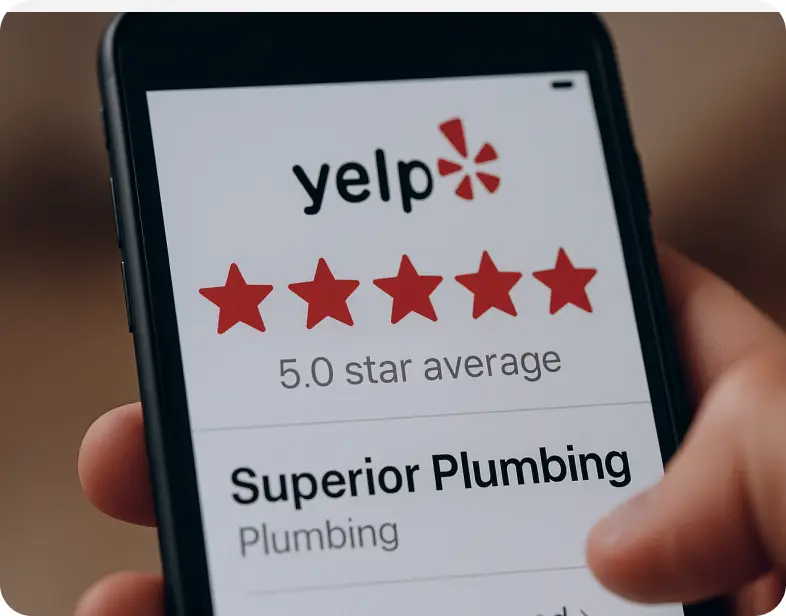
Off-page SEO is a bit more out of your control than on-page or technical factors, but you can definitely influence it by doing great work and engaging with your community (both online and offline). For instance, if you publish a really helpful guide on winterizing home plumbing, a local homeowner’s blog might link to it as a resource. That single link from a local site tells Google you have valuable content, and it can improve your rankings.
Over time, as you accumulate more of these positive signals – quality links, good reviews, and an active presence – your plumbing website will carry more authority, helping you rank higher across the board.
Scorpion Success Story: How One Plumbing Company Achieved 40x ROI
It’s one thing to talk about SEO in theory, but does it really deliver results? For Dyess Air & Plumbing, a long-time Scorpion client, the answer is a resounding yes. With the help of Scorpion’s RevenueMAX – this plumbing and HVAC business saw remarkable growth in a relatively short time. Here are some highlights of what Dyess achieved:
- 21% Increase in revenue: Double-digit growth in year-over-year revenue after ramping up their online marketing.
- 40x ROI on attributable revenue from digital marketing: For every $1 they invested in their Scorpion marketing, they generated about $40 in revenue. (Yes, 40 times return!)
- 17x ROI on paid advertising: Their targeted Google and Facebook ad campaigns, managed by Scorpion, produced $17 in revenue for every $1 spent on ads.
So, how did Dyess Air & Plumbing pull this off? They partnered closely with Scorpion to overhaul and maximize their digital presence. We built them a fast, mobile-friendly website and loaded it with strong content (so Google would rank it higher for plumbing searches in their areas). We also managed their online ad campaigns to capture immediate leads, and we continually monitored the results. Using Scorpion’s RevenueMAX approach, we tracked every phone call and form lead to see which turned into jobs and revenue. This clarity let Dyess see exactly what their marketing spend was producing – and the numbers were outstanding. Scorpion handled the heavy lifting of SEO, ads, and reputation management. That freed up the business to focus on serving customers.
The end result was more calls, more booked jobs, and ultimately more revenue, all while achieving an ROI that far exceeded their expectations.
Ready to Elevate Your Plumbing Business’s Online Presence?
By now, it’s clear that improving your SEO can have a major impact on your plumbing business – from climbing higher in search results to getting more calls and customers. We’ve covered what you can do on your own, and even seen how a company like Dyess Air & Plumbing achieved incredible growth by focusing on digital marketing. The opportunity is there: homeowners are searching every day for plumbing services, and SEO is the key to making sure those searches lead to your business.
We also understand that as a busy business owner, you might not have the time or desire to become an SEO expert – and you don’t have to. That’s where Scorpion comes in. We specialize in helping home services companies like yours succeed online, handling everything from SEO and website design to online ads and reputation management. Our team and technology (like the RevenueMAX platform) are here to take the marketing weight off your shoulders and deliver results that you can see in your bottom line.
If you’re ready to get more out of your online presence, let’s talk. Connect with our team or schedule a demo of Scorpion’s marketing platform today. We’ll show you exactly how we can tailor a strategy to your business and help you dominate your local market. Don’t let your competitors soak up all the online customers – take the next step toward growing your plumbing business with confidence.
